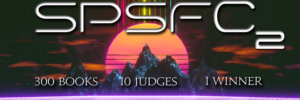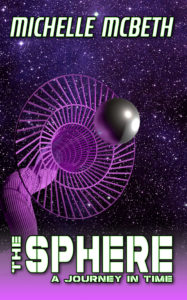
My judging team in the second annual Self-Published Science Fiction Competition (SPSFC2) has released our list of eight quarterfinalists, which we will be reading and reviewing over the next two months. Two of that quarterfinals group were the top two books that I selected out of my slush allocation. But two more–Fear by James McLellan and The Sphere: A Journey in Time by Michelle McBeth–were split decisions, where I didn’t recommend the books continue in the competition, but they went through on the strength of the other reader’s opinion.
Neither book was bad, and both saw me read more than 60% before deciding to recommend against them—not because I was hating the reading experience, but because they read like solid three-star novels when I was looking for fours and fives. But when my teammates pushed them to the next round, I circled back to finish and provide my own scores. Because of the disjointed reading experience and my lack of strong feelings, I won’t be posting reviews of my usual length, but rather have combined two smaller reviews into one post.
Fear by James McLellan

I admit that the title of James McLellan’s Fear had my expectations out-of-whack from the get-go. I could see that it was a story about movie-making in a sci-fi setting, but I expected it to turn in a survival horror direction. It took me embarrassingly long to realize that the title referenced the movie being made (Phobos) rather than the tenor of the novel itself.
Perhaps this put me in the wrong headspace to really appreciate what the novel was doing. But the lack of driving plot sure didn’t help correct my mistake. The prose is solid, and the setting is well-realized and appropriately drab. But the plot is just a director running into a series of problems—from securing funding to losing actors to various power plays by the involved entities to weather problems and accidents on set and pretty much anything else that can go wrong. There’s nothing that jumps out and asserts itself as the point of it all. It’s just a train wreck, and its success as a story relies on the audience not being able to look away.
And I admit that I stuck with it quite a while, with quality writing and borderline novella length bringing me past 60% before I’d even noticed. But I never connected with the lead enough—either positively or negatively—to generate emotional investment in the disaster, and with so many things going wrong, it was short on surprises that could generate tension. Eventually, I ran out of interest in all the small failures that could sink a movie. And while I can’t go below three stars for a book written reasonably well and without any glaring problems, that flatness prevented me from really being able to recommend it in the end. There’s not much that stands out, it’s just one mistake after another. That slow descent into failure, combined with the atmosphere, was enough for one of my teammates, and will doubtless be enough for some other readers. But for me, I just needed something else to grab my attention.
Recommended if you like: slow-burning train wrecks, farcical stories about movie-making.
Can I use it for Bingo? It’s hard mode for Standalone and Self-Published, in addition to having No Ifs Ands Or Buts.
Overall rating: 10 of Tar Vol’s 20. Two stars on Goodreads.
SPSFC Score: My personal score is 5/10. The official team score will be decided in concert with my teammates.
The Sphere: A Journey in Time by Michelle McBeth

For all that I dislike sci-fi that devolves into thriller plots, I do enjoy time travel tropes, and so despite a blurb with a whiff of thriller, I was intrigued by Michelle McBeth’s The Sphere: A Journey in Time. And while I had my complaints along the way, the opening only grew my interest. It’s far from tight, with a lot of time spent exploring the lead and her profession as a sort of time-traveling historian before really jumping into the plot. But if there was fluff that could’ve been stripped away, there was also a pair of charming characters at the forefront of the novel, and the fluid writing style made it easy to constantly read just one more chapter.
The arrival of the major hook made me all the more invested, setting up a compelling dilemma about how to respect the wishes of one person whose wishes change quite a lot over the years, and a more urgent question about how to protect a friend from a less-than-caring employer.
But time travel stories always depend on how everything comes together in the end, and I found my interest waning in the final third. There was plenty of running from enemies, along with some intricate working through timelines that may be fascinating to anyone gripped by the tale but didn’t offer so much to those on the fence. And after putting it down and returning, it became strikingly clear that the writing style that had drawn me in early had lost some of its smoothness and bingeability in the latter stages. This didn’t totally undo all the good work from the first half of the book, and it still delivered a satisfying ending. But there was a bit too much roughness–especially near the end–for me to enjoy the whole as much as I enjoyed the start. That said, there were enough flashes of quality that I didn’t object to my teammate sending it to the quarterfinals, and I’m certainly intrigued to see how the author develops over her career.
Recommended if you like: mind-bending time-travel thrillers.
Can I use it for Bingo? It’s hard mode for Self-Published, and has plenty of Wibbly Wobbly Timey Wimey stuff
Overall rating: 11 of Tar Vol’s 20. Three stars on Goodreads.
SPSFC Score: My personal score is 5.5/10. The official team score will be decided in concert with my teammates.
